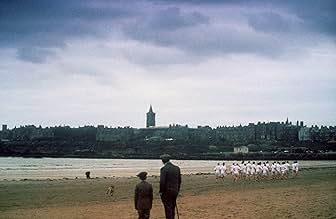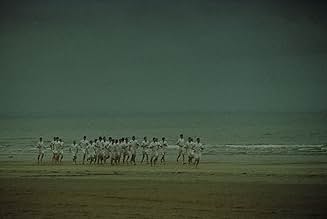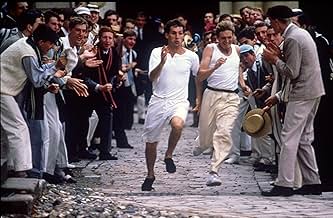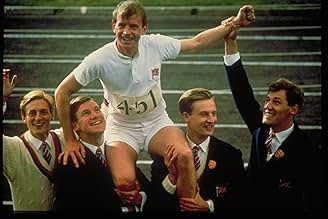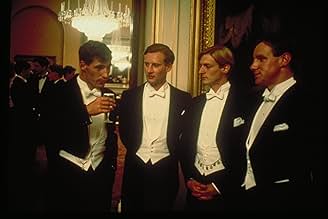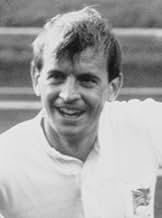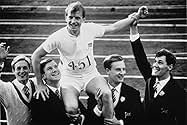Zwei britische Leichtathleten, einer ein frommer Jude und der andere ein frommer Christ, nehmen an den Olympischen Spielen 1924 teil.Zwei britische Leichtathleten, einer ein frommer Jude und der andere ein frommer Christ, nehmen an den Olympischen Spielen 1924 teil.Zwei britische Leichtathleten, einer ein frommer Jude und der andere ein frommer Christ, nehmen an den Olympischen Spielen 1924 teil.
- 4 Oscars gewonnen
- 18 Gewinne & 19 Nominierungen insgesamt
John Gielgud
- Master of Trinity
- (as Sir John Gielgud)
Empfohlene Bewertungen
"Chariots of Fire" is a fine motion picture that won the Best Picture Oscar in 1981, even though it was the longest of long-shots. The film deals with two young Englishmen (Ben Cross and Ian Charleson) who have hopes of glory at the 1924 Olympics. We see that their struggles almost cost them the opportunity to achieve the greatness that they both desire. When they are both ultimately successful, Charleson feels that his win is due to God's glory and accepts the medal with the greatest of pride and admiration. However, after Cross wins the gold he feels somewhat disappointed and realizes that what he thought he wanted was not what he really wanted at all. The insight into this motion picture is amazing. Both athletes convey very common feelings that most people experience if they are serious enough in what they are doing, whether it be sports or something else. The main focus of "Chariots of Fire" is that the journey to get to the destination is more important and uplifting than the destination itself. Many question the fact that this film won the Best Picture Oscar over "Reds" and "Raiders of the Lost Ark". However, this is one time I cannot say anything negative about the Academy's decision. The fact that this film won in 1981 is testimony to the fact that the Academy is one of the greatest organizations in the world. Kudos to all involved here. 5 stars out of 5.
This is the story of two men who run to prove something to the world . They will sacrifice anything to achieve their goals , except their honor . Two young men fighting for their objectives , one a determined Jew Harold Abrahams (Ben Cross) and the other a devout Christian (Ian Charleson) . In a warmup 100 meter race, Scottish Eric defeats Harold, who hires a pro coacher (Ian Holm) to prepare him . After that , both compete in the 1924 Olympics where their courage and determination to be tested . Eric Liddell , whose qualifying heat is scheduled for a Sunday, denies to run despite pressure from the Olympic committee formed by high authorities (Nigel Davenport , Patrick Magee , David Yelland as Prince of Wales) . Eric and Harold win their respective races and go on to achieve fame as missionary and businessman/athletic advocate, respectively . In fact , during the Japanese occupation of China, Eric as a missionary was taken into the Japanese Weihsien internment Camp, where he was to die from a brain tumour just before the camp was liberated.
This is is a sensitive as well as riveting story, being told in flashback , dealing with two young British sprinters , competing for fame in the 1924 Olympics , both of them compellingly performed by Ben Cross and the early deceased Ian Charleson . About six years after the film's release, Trinity College reenacted the quad dash with British Olympic athletes Steve Ovett and Sebastian Coe taking part.
This marvelous film has an all-star-cast such as Ben Cross ,Ian Charleson , Nigel Havers , Ian Holm , Cheryl Campbell and Alice Krige . Great secondary cast formed by prestigious British players and with a number of well known USA and UK performers for the tiny cameo roles such as John Gielgud ,Nigel Davenport , Lindsay Anderson , Patrick Magee , Peter Egan , Richard Griffiths and uncredited Kenneth Branagh as Cambridge student , Stephen Fry and first cinema film of Nicholas Farrell . Brad Davis and Dennis Christopher appeared as a favor to producer David Puttnam, waiving their fees, in order to attract finance from backers who wanted "marquee names" . Besides the lead actors, most of the white-clad runners training on West Sands in St. Andrews during the title sequence are St. Andrews golf caddies .
Colorful and evocative cinematography by David Watkin filmed on location in Edinburgh, Scotland, Liverpool , Cambridge University , Eton College, Eton, Berkshire, England . When the athletes are running off the beach , in reality it results to be West Sands at St Andrews in Scotland , they run towards a large red building clearly marked as a hotel ; this is in fact Hamilton hall of residence, a student accommodation hall belonging to the University .
Lavishly and luxuriously produced by great producer David Puttnam , he was looking for a story in the mold of A man for eternity (1966), regarding someone who follows their conscience ; he felt sports provided clear situations in this sense, and happened upon the story by accident while thumbing through an Olympic reference book in a rented house in Los Angeles , then the screenwriter Colin Welland took out advertisements in London newspapers seeking memories of the 1924 Olympics.
Film debut by filmmaker Hugh Hudson , he originally wanted Vangelis' 1977 tune "L'Enfant", from his 1979 'Opera Sauvage' album, to be the title theme of the film, and the beach running sequence was actually filmed with "L'Enfant" playing in the background for the runners to listen and pace to. Vangelis, however, finally convinced Hudson he could create a new and better piece for the film's main theme - and when he played the new and now-familiar "Chariots of Fire" theme for Hudson, it was agreed the new tune was unquestionably better. But the "L'Enfant" tune still made it into the film : When the athletes reach Paris and enter the stadium, a brass band marches through the field, and first plays a modified, acoustic performance of "L'Enfant" . Vangelis's electronic "L'Enfant" track eventually was used prominently in the film The years of living dangerously (1982). The picture deservedly won Academy Awards for Colin Welland's screenplay , Vangelis' magnificent soundtrack , Mila Canonero's costumes and Best picture .
This is is a sensitive as well as riveting story, being told in flashback , dealing with two young British sprinters , competing for fame in the 1924 Olympics , both of them compellingly performed by Ben Cross and the early deceased Ian Charleson . About six years after the film's release, Trinity College reenacted the quad dash with British Olympic athletes Steve Ovett and Sebastian Coe taking part.
This marvelous film has an all-star-cast such as Ben Cross ,Ian Charleson , Nigel Havers , Ian Holm , Cheryl Campbell and Alice Krige . Great secondary cast formed by prestigious British players and with a number of well known USA and UK performers for the tiny cameo roles such as John Gielgud ,Nigel Davenport , Lindsay Anderson , Patrick Magee , Peter Egan , Richard Griffiths and uncredited Kenneth Branagh as Cambridge student , Stephen Fry and first cinema film of Nicholas Farrell . Brad Davis and Dennis Christopher appeared as a favor to producer David Puttnam, waiving their fees, in order to attract finance from backers who wanted "marquee names" . Besides the lead actors, most of the white-clad runners training on West Sands in St. Andrews during the title sequence are St. Andrews golf caddies .
Colorful and evocative cinematography by David Watkin filmed on location in Edinburgh, Scotland, Liverpool , Cambridge University , Eton College, Eton, Berkshire, England . When the athletes are running off the beach , in reality it results to be West Sands at St Andrews in Scotland , they run towards a large red building clearly marked as a hotel ; this is in fact Hamilton hall of residence, a student accommodation hall belonging to the University .
Lavishly and luxuriously produced by great producer David Puttnam , he was looking for a story in the mold of A man for eternity (1966), regarding someone who follows their conscience ; he felt sports provided clear situations in this sense, and happened upon the story by accident while thumbing through an Olympic reference book in a rented house in Los Angeles , then the screenwriter Colin Welland took out advertisements in London newspapers seeking memories of the 1924 Olympics.
Film debut by filmmaker Hugh Hudson , he originally wanted Vangelis' 1977 tune "L'Enfant", from his 1979 'Opera Sauvage' album, to be the title theme of the film, and the beach running sequence was actually filmed with "L'Enfant" playing in the background for the runners to listen and pace to. Vangelis, however, finally convinced Hudson he could create a new and better piece for the film's main theme - and when he played the new and now-familiar "Chariots of Fire" theme for Hudson, it was agreed the new tune was unquestionably better. But the "L'Enfant" tune still made it into the film : When the athletes reach Paris and enter the stadium, a brass band marches through the field, and first plays a modified, acoustic performance of "L'Enfant" . Vangelis's electronic "L'Enfant" track eventually was used prominently in the film The years of living dangerously (1982). The picture deservedly won Academy Awards for Colin Welland's screenplay , Vangelis' magnificent soundtrack , Mila Canonero's costumes and Best picture .
I watched this again last night. I had forgotten just how beautifully done it was - both a character study of two very different men and a gripping plot of their attempts to succeed - partly through athletics. the writer and director so well convey both Cambridge and the Edinburgh Presbyterian missionary disciples, in the early 1920s so very well.
The acting is superb - I had never seen a character presented like Eric Liddell in movies - how fine Ian Charleson was in this role, the softness of his voice, his ease and joy in running competitively (especially in contrast with the tense tortured Harold Abrahams). I also loved the more supporting roles - I've read a biography of F.E. Smith and Nigel Davenport is exactly how I would imagine him. The actor who played the Prince of Wales also seemed exactly right with his effortless charm, looks, and lack of imagination. Ian Holm, John Gielgud, Lindsay Anderson - all wonderful.
The actors weren't chosen for glamour either - Liddell and Abrahams are not Leni Riefenstahl images of athletic ideals, Liddell's sister is no beauty - and Abrahams' girlfriend is pretty but not stunning. It made them seem more real. (In nice contrast were the near-pretty boy looks of Nigel Havers as Lord Lindsay - it so suited his character).
The races are riveting - partly due to the music and sound effects.
So many small things are done so well - e.g., when Lord Lindsay has the confidence of his class to barge into a room containing the Prince of Wales, and three other lords (including Birkenhead and the head of the British Olympic Committee) and greets them by name - no need for introduction there (as there was for Liddell). It's small but seems quite real.
As an American, it was interesting and funny to see our Olympic team shown as the numerous, ominous, invulnerable "other"! (something like watching a Rocky movie with Rocky as the product of a Russian or East German success machine!). In fact, the one scene that seemed a bit off was the scene of the American track athletes warming up for the Games - all heavy music, machine like athletes, ferocious coach yelling with a megaphone into people's ears. It pounded too hard on the "these are the scary almighty inhuman opponents" theme in contrast to the cheerful British boys running along the beach.
Something I had forgotten about the movie was how stubborn BOTH protagonists are - Liddell fully as much as Abrahams. Liddell is not overly deferential or bashful when dealing with the Prince of Wales - but instead straightforward and very firm.
I truly can't understand anyone not liking this movie - it is very exciting even on the basic level of "will they win?" and so much more. (For example, Ian Holm's character's reaction to success after 30 years is very moving). Those who write to say that "Reds" deserved the Oscar more - are simply wrong. (Reds was so simplistic that it felt like watching the movie "The Hardy Boys Go to the Russian Revolution"). Those who say they cannot differentiate among the boys or between the Scottish and English accents - well, it sounds like some political statement to me.
Do watch it - it's very fine, very moving, very exciting.
The acting is superb - I had never seen a character presented like Eric Liddell in movies - how fine Ian Charleson was in this role, the softness of his voice, his ease and joy in running competitively (especially in contrast with the tense tortured Harold Abrahams). I also loved the more supporting roles - I've read a biography of F.E. Smith and Nigel Davenport is exactly how I would imagine him. The actor who played the Prince of Wales also seemed exactly right with his effortless charm, looks, and lack of imagination. Ian Holm, John Gielgud, Lindsay Anderson - all wonderful.
The actors weren't chosen for glamour either - Liddell and Abrahams are not Leni Riefenstahl images of athletic ideals, Liddell's sister is no beauty - and Abrahams' girlfriend is pretty but not stunning. It made them seem more real. (In nice contrast were the near-pretty boy looks of Nigel Havers as Lord Lindsay - it so suited his character).
The races are riveting - partly due to the music and sound effects.
So many small things are done so well - e.g., when Lord Lindsay has the confidence of his class to barge into a room containing the Prince of Wales, and three other lords (including Birkenhead and the head of the British Olympic Committee) and greets them by name - no need for introduction there (as there was for Liddell). It's small but seems quite real.
As an American, it was interesting and funny to see our Olympic team shown as the numerous, ominous, invulnerable "other"! (something like watching a Rocky movie with Rocky as the product of a Russian or East German success machine!). In fact, the one scene that seemed a bit off was the scene of the American track athletes warming up for the Games - all heavy music, machine like athletes, ferocious coach yelling with a megaphone into people's ears. It pounded too hard on the "these are the scary almighty inhuman opponents" theme in contrast to the cheerful British boys running along the beach.
Something I had forgotten about the movie was how stubborn BOTH protagonists are - Liddell fully as much as Abrahams. Liddell is not overly deferential or bashful when dealing with the Prince of Wales - but instead straightforward and very firm.
I truly can't understand anyone not liking this movie - it is very exciting even on the basic level of "will they win?" and so much more. (For example, Ian Holm's character's reaction to success after 30 years is very moving). Those who write to say that "Reds" deserved the Oscar more - are simply wrong. (Reds was so simplistic that it felt like watching the movie "The Hardy Boys Go to the Russian Revolution"). Those who say they cannot differentiate among the boys or between the Scottish and English accents - well, it sounds like some political statement to me.
Do watch it - it's very fine, very moving, very exciting.
'tis been said that this movie is loved or hated, no middle ground.
I believe I know why.
It touches the most fundamental instincts and feelings in all of us.
The question it compels us to ask is, "Do I have a piece of greatness to offer to the world"?
Those of us who would answer yes, whether we believe is achievable or not, would love this movie, because it epitomizes the potential of our dreams, not just in running, but in any walk of life.
Those of us who would answer no, would hate this movie, because it highlights our acceptance of mediocrity, and of surrendered dreams.
Also, this movie touches those who have succeeded also.
It shows that there are two ways to succeed, the one not shown in the movie, and the one shown.
The one not shown is the one that motivates most truly successful people today. win at any cost, in sports, business, etc. and the consequences be damned.
The way to succeed shown in Chariots of Fire is probably naive by today's standards, but nonetheless noble and uplifting.
It tells us that success achieved through dedication, commitment, honesty and sacrifice is the noblest achievement a person can attain, and provides examples for others to emulate.
Liddell and Abrahams are not examples for runners, they are examples for people, true heroes of the spirit, not sport.
An unforgettable phrase, a torch to some and a knife to others,
" So where does the power to succeed come from?... It comes from within"
Those of us who have it, love it, those of us who do not have it, hate it.
If I live to be 100, I will still have my dreams stirred back to life by the message in this film
I believe I know why.
It touches the most fundamental instincts and feelings in all of us.
The question it compels us to ask is, "Do I have a piece of greatness to offer to the world"?
Those of us who would answer yes, whether we believe is achievable or not, would love this movie, because it epitomizes the potential of our dreams, not just in running, but in any walk of life.
Those of us who would answer no, would hate this movie, because it highlights our acceptance of mediocrity, and of surrendered dreams.
Also, this movie touches those who have succeeded also.
It shows that there are two ways to succeed, the one not shown in the movie, and the one shown.
The one not shown is the one that motivates most truly successful people today. win at any cost, in sports, business, etc. and the consequences be damned.
The way to succeed shown in Chariots of Fire is probably naive by today's standards, but nonetheless noble and uplifting.
It tells us that success achieved through dedication, commitment, honesty and sacrifice is the noblest achievement a person can attain, and provides examples for others to emulate.
Liddell and Abrahams are not examples for runners, they are examples for people, true heroes of the spirit, not sport.
An unforgettable phrase, a torch to some and a knife to others,
" So where does the power to succeed come from?... It comes from within"
Those of us who have it, love it, those of us who do not have it, hate it.
If I live to be 100, I will still have my dreams stirred back to life by the message in this film
On a basic level it is the ultimate British Oscar-winning period piece and influential, uplifting feel-good film. Its two chief qualities are its subsequently strong realism and the resonant Vangelis soundtrack that, as with 'Blade Runner', increases the strength and significance of scenes through sound. Although it has a specific setting or historical background, the music adds an appropriate timelessness to the powerfully relevant human themes. These include winning and losing, of having what it takes to run the race, and of the old gentlemanly values of religion, decency and personal honour. It is the determining of the self, the inner strength, by understanding and will. The real-life characters and events are brought to life with the engaging realization that a climax will arrive at the end. At its core is a rivalry, less of a personal one and more the dilemma of two men wanting to win the same race. However, the climax is not predictable for such a straight-forward competition cannot occur. That is to say, they are both dedicated and honest men, with completely different religions, and it is this combination of resolution and talent which enables them both to win their own race. Around this central thread of training and determination, the film-makers have recreated the world surrounding these university characters in the 1920s. Scenes are filled with the casual, graceful attitudes that are a very British ideal; sophisticated prowess, decency, honesty, religion and intellect, values which seem to be less respected in this modern time. It portrays a credible idealism.
One of the first scenes of the film shows the running students. It celebrates this stage in life of onsetting maturity, comraderie and destiny through this bygone group of individual characters, united by the shared realization of their strengths. Throughout there is also the vague impression of higher powers at work, not so much the embedded attitudes of the old generation, but the position of man's humility in experiencing the challenge of life's great race created for them, and not only feeling the love that can be found, but rising to shine in one's own glory, enabled because of the higher glory. Not many viewers, especially today, accept such adherence and orthodoxy to Christianity, that can be seen as the motivation for the character Liddell. This film reminds us of the prominence and influence it had over so many aspects of society and the beneficial, empowering effects it could give to individuals. Alternatively the character Abrahams is a jew, and relies more on the attributes of his character which include a desperate determinism that reaps a reward of its own, takes him to his limits - although of greater significance is the love of a woman which detracts from perhaps a too heightened focus on himself. Through him we must also realise that there will always be those greater than ourselves, the very fact of our losing, and ultimately swallow pride and feel awe and goodness for the victory of our rivals and our friends. At the end of the film, the race has been run; they have gloriously discovered and revelled in their talents, their time, the fruits of aspiring to something greater than themselves. 'For it says in the good book, he that honours me, I will honour'.
One of the first scenes of the film shows the running students. It celebrates this stage in life of onsetting maturity, comraderie and destiny through this bygone group of individual characters, united by the shared realization of their strengths. Throughout there is also the vague impression of higher powers at work, not so much the embedded attitudes of the old generation, but the position of man's humility in experiencing the challenge of life's great race created for them, and not only feeling the love that can be found, but rising to shine in one's own glory, enabled because of the higher glory. Not many viewers, especially today, accept such adherence and orthodoxy to Christianity, that can be seen as the motivation for the character Liddell. This film reminds us of the prominence and influence it had over so many aspects of society and the beneficial, empowering effects it could give to individuals. Alternatively the character Abrahams is a jew, and relies more on the attributes of his character which include a desperate determinism that reaps a reward of its own, takes him to his limits - although of greater significance is the love of a woman which detracts from perhaps a too heightened focus on himself. Through him we must also realise that there will always be those greater than ourselves, the very fact of our losing, and ultimately swallow pride and feel awe and goodness for the victory of our rivals and our friends. At the end of the film, the race has been run; they have gloriously discovered and revelled in their talents, their time, the fruits of aspiring to something greater than themselves. 'For it says in the good book, he that honours me, I will honour'.
Oscars Best Picture Winners, Ranked
Oscars Best Picture Winners, Ranked
See the complete list of Oscars Best Picture winners, ranked by IMDb ratings.
Wusstest du schon
- WissenswertesWhen Colin Welland completed his first draft, the only title he could come up with was "Runners". Then, one Sunday evening he turned on BBC's religious music series Songs of Praise (1961), featuring the hymn "Jerusalem," with lyrics from a poem by William Blake. The chorus included the words "Bring me my chariot of fire". The writer leaped to his feet and shouted to his wife, "I've got it, Pat! 'Chariots of Fire'!" (The "Jerusalem" hymn is featured at the beginning and end of the movie.)
- PatzerWhen signing an autograph for a young fan, Eric Liddell does not unscrew or remove any cap from the pen he uses. As all fountain pens have caps, he seems to be using a modern day ballpoint pen which was not invented until 1938.
- Zitate
Eric Liddell: I believe God made me for a purpose - but He also made me fast. And when I run, I feel His pleasure.
- Alternative VersionenThere is at least one slightly different version of the movie, issued in Europe on homevideo. The beginning is different - shorter - and introduces Harold Abrahams while playing cricket with his colleagues. The scene in the train station, where Monty meets Harold is absent, as well as the loading of the baggage in the taxi they share. We simply see Monty writing a letter to his parents, mentioning that "Harold is as intense as ever" (cut to the cricket scene, maybe 30 seconds long), and then continues with "I remember our first day... we shared a taxi together" (cut to the two students unloading their stuff from the car). This alternate version also have slightly different end credits, and does not mention Harold marrying Sybil. The differences are minor (the U.S. version provides a more shocking memento of WWI, when it shows crippled baggage handlers in the station); one of the reasons the cricket scene was dropped in favour of the station one was due to the distributor's worry that the American market would not understand it.
- VerbindungenFeatured in Vangelis: Chariots of Fire (1981)
- SoundtracksHe is an Englishman
(1878) (uncredited)
from "H.M.S. Pinafore"
Music by Arthur Sullivan
Lyrics by W.S. Gilbert
Top-Auswahl
Melde dich zum Bewerten an und greife auf die Watchlist für personalisierte Empfehlungen zu.
- How long is Chariots of Fire?Powered by Alexa
Details
- Erscheinungsdatum
- Herkunftsland
- Sprachen
- Auch bekannt als
- Carros de fuego
- Drehorte
- Produktionsfirmen
- Weitere beteiligte Unternehmen bei IMDbPro anzeigen
Box Office
- Budget
- 5.500.000 $ (geschätzt)
- Bruttoertrag in den USA und Kanada
- 58.972.904 $
- Eröffnungswochenende in den USA und in Kanada
- 68.907 $
- 27. Sept. 1981
- Weltweiter Bruttoertrag
- 59.317.376 $
- Laufzeit2 Stunden 5 Minuten
- Farbe
- Sound-Mix
- Seitenverhältnis
- 1.85 : 1
Zu dieser Seite beitragen
Bearbeitung vorschlagen oder fehlenden Inhalt hinzufügen








